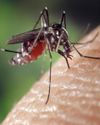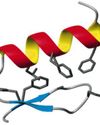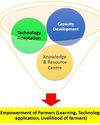
Small non-coding RNAs such as micro-RNA (22 nucleotide length) and small interfering RNA (siRNA; 21-24 nucleotide length) suppress the gene expression by degradation of corresponding messenger RNA (mRNA) molecules. These small RNAs can be produced either endogenously or exogenously provided to the cell. These small RNAs are processed by Dicer-like enzyme (DCL) and then RNA-induced silencing complex (RISC) assembly is formed with the help of argonaute (AGO) protein. Further, they target their complementary mRNAs and then either silence its expression by partial (by miRNA) or complete degradation the target mRNA (by siRNA). It has also been reported that siRNA also leads to the production of secondary siRNA, which are 21 nucleotides (nt) in length. These secondary siRNAs further amplify the silencing process. SiRNAs which are of 22 nt length, is processed by DCL2 while 24 and 21 nt siRNA are processed by DCL3 and DCL4 enzymes respectively. Various functions have been assigned for 21 and 24 nt siRNAs; however, much has not been known about 22 nt siRNAs. Recently these 22 nt siRNA have been identified in various functions such as environmental stress and nutrient deficiency (Wu et al. 2020).
Seed coat color in soybean
Denne historien er fra May - June 2021-utgaven av Scientific India.
Start din 7-dagers gratis prøveperiode på Magzter GOLD for å få tilgang til tusenvis av utvalgte premiumhistorier og 9000+ magasiner og aviser.
Allerede abonnent ? Logg på
Denne historien er fra May - June 2021-utgaven av Scientific India.
Start din 7-dagers gratis prøveperiode på Magzter GOLD for å få tilgang til tusenvis av utvalgte premiumhistorier og 9000+ magasiner og aviser.
Allerede abonnent? Logg på

An insight into Chandipura virus in India
Recently lot of news regarding disease due to Chandipura virus has emerged in various newspapers/magazines. After reading the reports published it seems that thing is still brewing in the natures nest and it could affect mankind.

Why elephants never forget?
An elephant has a very large brain for its size and the 'temporal lobe' region responsible for memory is more developed with a greater number of folds - this results in powerful abilities to 'download' important survival data such as where to find food and water, and who is friend or foe.

Use of Algae for Wastewater Treatment Containing Heavy Metals
Wastewater treatment is a critical environmental issue particularly when it comes to the removal of heavy metals.

Nano priming Seeds: A Small Innovation Sparkling Big Advances in Germination
Nanopriming is an emerging agricultural technique where the seeds are treated with nanoparticles to improve their germination, growth, and overall performance.

Nobel Laureates in Physics 2024: Revolutionizing AlThe Physics Foundations Behind Machine Learning
This year's two Nobel Laureates in Physics have used tools from physics to develop methods that are the foundation of today's powerful machine learning.

Revolutionizing Biology: The 2024 Nobel Prize in Chemistry Celebrates Breakthroughs in Protein Design and Structure Prediction
The Nobel Prize in Chemistry 2024 is about proteins, life's ingenious chemical tools.

New findings on animal viruses with potential to infect humans
Scientists investigating animal viruses with potential to infect humans have identified a critical protein that could enable spillover of a family of organisms called arteriviruses.

Father-Daughter Team Decodes Mars' Alien Signal
There is no definitive answer to whether aliens exist, but there is a lot of work being done to find out:

Krishi Vigyan Kendras: Working for Farmer's Welfare
Krishi Vigyan Kendras (Farm Science Centres) are the District level institution serving as an agriculture knowledge resource & capacity development centre which plays indispensable role in front line extension regarding agriculture system in scientific way.

Sixth generation Computer: The future computing technology
We are in a transition towards a digital world, where everything will be dealt with in digital format.